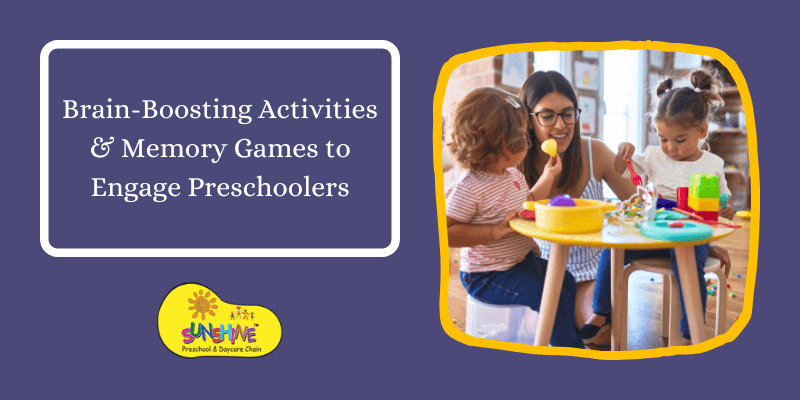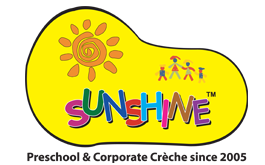Brain-Boosting Activities & Memory Games to Engage Preschoolers

While little children's brains are malleable and prepared to get a head start on life, it is vital for them to build their executive functioning and cognitive skills when they begin their academic learning journey in preschool. As reported by experts, 80% of a child’s brain development is over by age 5, and hence, it’s important to provide them with the right learning at an early age.
Additionally, even if the majority of preschools offer planned activities for your child's growth and development, it is crucial that you devote attention to your child’s cognitive development as a parent. One way to go about it is indulging in some brain-boosting activities for preschoolers. Brain-boosting exercises can be both physical and mental. They not only support academic improvement but also give the young ones a way to release their energy.
And although these tasks are vital, they don't have to be boring. Let’s discuss some brain-boosting activities and memory games for preschoolers that will result in not only the healthy development of their minds but also their bodies.
10 Brain-boosting Activities to Enhance Your Preschooler’s Cognitive Skills
Here are five of the best brain-boosting activities and memory games for preschoolers:
-
Building Blocks
Building blocks provide your kid with mental stimulation while also helping them learn to recognize shapes and colors. These kinds of toys are widely accessible in local stores for children of all ages. Along with developing their creative abilities, they also assist kids in learning about gravity, leverage, size, structure, weight, and balance.
-
Puzzles & Mazes
Children of all ages typically find puzzles fascinating, and for a good reason. They help your child develop not only hand-eye coordination but also logical reasoning at a young age, which may aid with decision-making generally in the future. Similar to puzzles, mazes help children develop their logical reasoning, but they also help them improve their vision and fine motor skills as they attempt to control their pencils with their fingers while visualizing a way.
-
Word Hunt
Put together a few images of various animals or objects, then list their names on a piece of paper. After your child has read the word, have them choose that object from the pictures. This game promotes reading, word formation, and vocabulary development.
-
Feely Boxes
Feely boxes are an excellent method for strengthening your child's neural networks. All you need to do is put familiar items inside a box, secure the lid, and ask them to place their fingers inside. As they try to remember the objects placed in the box, they must make a guess at the object they grasp hold of with the sensory information they have without being able to see it. This requires that they use their working memory and sensory information.
-
Physical Games
Playing physical games with your child allows them to practice their executive function skills while using their entire body. Throwing and catching balls, jumping, and running to and from finish lines are excellent for improving both physical and mental fitness. Games like Simon Says, tug of war, and ring around the Rosie are very helpful when it comes to inhibitory control since they require your child to focus on a certain movement or body part when you speak a specific phrase.
-
Matching Games
You can play matching games with your child using free printable memory matching cards, or you can buy a set of matching cards from a retailer. All you need to do is arrange a few pairs of matching cards face down in a grid. Your child must choose any two cards. If they match, you separate them and award them 5 points as a reward. If they don't match, they are placed face-down in their original locations for your kid to choose from again.
-
What's Missing
Give your child a tray with a few common objects on it to memorize for one minute. Ask them to close their eyes as you shuffle the items and take something out of the tray, quietly hiding it. Ask them to open their eyes and point out what's missing from the tray. Start off with 3–4 objects while working with younger kids, then add more as the challenge increases.
-
Magic Cup Game
On a table, arrange three similar cups and flip them over. Place a little ball or another small item beneath one of the cups. You should ask your child to pay close attention while you move the cups. All they have to do to win is choose the cup that carries the item. For older children, try utilizing a larger number of cups.
-
Total Recall
Show a collection of images, objects, or words for a short amount of time. Ask your child to memorize the objects and their proper sequence. Once finished, have them tell you all the items or, to make it a little trickier, have them draw it on paper. For older kids, you could also ask them to write it down instead.
-
Card Recall
Card recall is a game that is typically played using playing cards. It is similar to total recall but trickier than that. Display a set of cards (at least five at first) for a limited amount of time and have them memorize the cards as well as their correct order. Ask them to describe the cards to you in the right sequence. To make it more difficult, you may shuffle the cards, remove one card, and then lay the other cards in front of them while asking them to find the missing card.
Conclusion
Brain power grows gradually from childhood through adolescence. All of these brain-boosting activities and memory games employ the child's intellect, body, and senses simultaneously while teaching them how to use them to make things happen, stimulating their neurodevelopment and providing them an edge in the classroom and life in general. It's extremely crucial for parents to participate in their children's playtime. However, it is critical not to overburden children with too many activities, as they may lose some of the benefits.
Enhance the Growth of Your Preschooler with Sunshine Preschool & Corporate Crèche
Sunshine Preschool & Corporate Creche has been a pioneer in India since 2005. Our team of professionals is committed to offering comprehensive student development through our online preschool. With our online preschool program created in strategic partnership with Old Station Nursery Chain, UK, your kid’s learning never gets dull. Get in touch with us right away to enroll your kid today!
Be the first to post a comment



Leave a Reply Cancel reply